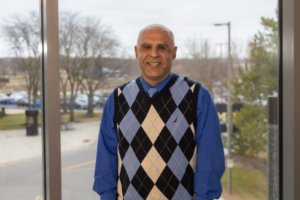Nathaniel Cordova is a full-time undergraduate student at the University of Michigan-Flint slated to graduate with a Bachelor’s in Psychology in December 2022. Shortly after he transferred from Youngstown State University in Ohio, he asked psychology professor Thomas Wrobel what he should do to better prepare for a PhD or Master’s program. Wrobel told him the best thing he could do is find research that interests him and get involved. Wrobel pointed him to the Infoready site and, because he was so enthusiastic, brought Cordova in on his own research project, supported by the Undergraduate Research Opportunity Program. The two recently completed a study comparing vaccine uptake and hesitancy among undergraduate students before and after the COVID pandemic.
Wrobel had started the vaccine hesitancy study in 2019, before the COVID pandemic and the political climate placed vaccines in the center of a heated debate in America. In addition to concerns with needle phobia, the project looked at a wide range of psychological barriers. The study included concerns about the vaccines themselves, risk and social benefit perceptions, negative attitudes towards vaccines, lack of experience with illness and knowledge of vaccines. Cordova worked on data analysis for the first study and helped develop a post-COVID survey to measure changes post-COVID. “It wasn’t good that the pandemic happened,” Cordova said, “but it was pretty great that we were able to take advantage of the opportunity to study how it affected students’ perceptions of vaccines.”

Due to national and university vaccine mandates, Cordova and Wrobel found that student uptake was not affected, but there was increased hesitancy and anxiety around vaccines. They concluded that this may reflect a change in attitude toward vaccinations in general and the COVID-19 vaccines in particular. They pointed to a need for a more general sample than the undergraduate students in the two cohorts to seek more comprehensive data. The two presented their findings at the Midwestern Psychological Association’s 2022 Conference in Chicago this past April.
Following the conference, Cordova continues to work with Wrobel on another important project looking at the psychological effects of the Flint Water Crisis on the city’s residents. To help with this, Cordova is coding and generating tables in Statistical Package for the Social Sciences (SPSS) software. “My biggest take away from this was interpretation,” he says, “It’s easy to look at the numbers and jump the gun in their implications when an element is significant. I feel that this awareness is super important when reporting findings in order to give others an accurate impression of the study.”
Wrobel has been examining the Flint water crisis from its early days, using the Depression Anxiety Stress Scale (DASS) to assess mental health residents, as well as how much residents trust the government. Wrobel and Cordova found higher reports of depression, anxiety, and stress, and significantly less trust in government information, among study participants at-risk of exposure to Flint water compared to participants not at-risk. Dr. Wrobel presented their findings in early August at the 2022 American Psychological Association Convention, and they continue to analyze the accumulated data.
Cordova branched out with another UROP research project this summer and joined an interdisciplinary team working on developing a mobile application to help people with Parkinson’s Disease measure their symptoms using their mobile phones. Working with Associate Professor of Psychology Nathaniel Miller, Cordova is helping with data analysis, coding, and formatting of graphs and tables for Healthcare provider usability.
“One thing that I’m really excited about is working with (Miller) on an upcoming grant to study user design of self-driving vehicles for people with Parkinson’s disease,” said Cordova. “We’ll be in the car with them, interviewing them, evaluating their responses to it and questioning them on ways it can be improved for them.”
Cordova’s identity as a first-generation college student is meaningful to him. “Both my mom and my dad’s side of the family are very blue collar, and they had similar perspectives on work and adulthood and growing up, and I always found that very interesting,” he said “I always knew I wanted to go to college and had plans for it, but was kind of deterred from it.” He explained that noticing how the people in your environment offer different influences, and change your perspective, got him really interested in psychology around junior high school.
Since then, taking different psychology classes helped shape Cordova’s plan to go into clinical psychology and pursue a career related to forensics. A career possibility he has explored in conversations with an FBI recruiter.
For Cordova, the biggest impact was his professors’ enthusiasm. “They’re really open with questions,” he said, “They don’t get frustrated. If I ask a question, they give me a ton of resources and make sure I’ve got it, and I think that’s the most important thing. They want to shape you into a professional.”
Cordova also works as a behavioral health specialist while completing his degree. He says the UROP grant money really helps him because the research does take time. “I can take hours away from my actual job, gain experience, and develop my skills while I’m at it,” he says. Cordova’s experience highlights just how much getting involved in research can help students find a more stable path toward the way they want to make a difference in the world.
This article previously released, in part, on UM-Flint’s NOW News & Happenings on August 1, 2022.





